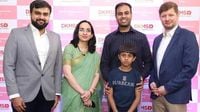Delhi, May 08, 2025: In a heartwarming encounter, 12-year-old thalassemia survivor Pratham from Bikaner met the man who gave him a second chance at life, his stem cell donor, 35-year-old Rohit from Kanpur, for the first time. The donor, a pharmaceutical management consultant, was inspired to register with DKMS Foundation India, a non-profit organization dedicated to fighting blood cancer and other blood disorders, after watching the Bollywood film “The Sky is Pink,” which depicts the struggles of a family with a child facing a life-threatening illness.
Thalassemia is an inherited blood disorder that causes the body to produce less hemoglobin than normal. This condition can lead to anemia, fatigue, and other serious health problems. A stem cell transplant can offer a potential cure for thalassemia patients by replacing their damaged blood-forming cells with healthy ones from a donor. “Thalassemia continues to place an immense physical and emotional burden on children and their families, especially in India, where the incidence remains among the highest globally. While blood transfusions are a temporary solution, stem cell transplantation offers the only curative path forward. For many patients without a matching sibling, a matched unrelated donor (MUD) transplant becomes their only lifeline. The challenge, however, lies in finding that one-in-a-million match,” explained Dr. Esha Kaul, Director of Hematology, Hemato-Oncology, BMT, from Max Super Specialty Hospital, Vaishali.
Diagnosed at just six months of age, Pratham spent much of his early life undergoing frequent and distressing blood transfusions. For nearly seven years, his family searched tirelessly for a matching stem cell donor, never giving up hope. “When Pratham first came to us, he was very young and playful. We gave him all the support and treatment, but a stem cell transplant was his only curative option. Luckily, he found a matched unrelated donor, and we could proceed with the stem cell transplant. His story is a powerful reminder that thalassemia can be effectively managed with early diagnosis and the proper medical interventions,” shared his treating expert, Dr. Vikram Mathews, Director at CMC and Professor of Hematology, Department of Hematology at Christian Medical College Vellore.
That hope turned into reality when, on his mother’s birthday, the family received a call informing them that a perfect match had been found through DKMS Foundation India. That match was 35-year-old Rohit, who had registered as a donor during the COVID-19 pandemic after being inspired by a film that mentioned information about DKMS in its credits. He registered online and ordered a home swab kit, and eight months later, was identified as the life-saving match for Pratham.
The meeting between Pratham and Rohit was an emotional and joyous occasion, filled with tears of gratitude and heartfelt appreciation. Pratham and his family expressed their profound thanks to Rohit for giving them a second chance at life. “Seeing Pratham smile in person was overwhelming,” said Rohit, who met Pratham in Delhi for the first time. “I feel proud to have helped in this small but meaningful way.”
“Thanks to Rohit’s kindness, I no longer need blood transfusions or painful needle pricks. I feel strong and happy,” said Pratham, who now attends school regularly, participates in extracurricular activities, and pursues his love for cricket. Rohit’s stem cell donation, starting with a simple cheek swab, cured Pratham’s thalassemia, and their emotional reunion celebrated this life-changing gift of hope and selflessness.
India sees over 10,000 children born with thalassemia each year. Regular transfusions are the norm for many, but a blood stem cell transplant remains the only curative option. However, the availability of matching donors, especially from Indian ethnic backgrounds, is critically low. Pratham’s journey serves as a beacon of hope for thalassemia patients and their families and highlights the impact of the DKMS-Thalassemia program.
“DKMS Foundation India’s Access to Transplantation (ATT) Program is working to bridge the gap in affordability and accessibility that too often stands between patients and curative treatment. From offering free HLA typing for thalassemia patients to providing financial support through our Patient Funding Program, we’re addressing key barriers families face in their transplant journey,” said Patrick Paul, Chairman of DKMS India.
Thalassemia is a genetic blood disorder that impairs hemoglobin production, requiring regular transfusions unless cured via transplantation. The estimated carrier frequency varies across regions, with higher prevalence reported in certain communities, notably among northern, central, and parts of southern India. The clusters with higher prevalence often include tribal groups, Punjabis, Gujaratis, and populations in regions with a high degree of consanguinity, which increases the risk of inheriting the disorder.
Thalassemia is treatable, but it requires comprehensive medical management. The cornerstone of treatment is regular red blood cell transfusions, which help maintain adequate hemoglobin levels. However, transfusions can lead to iron overload, necessitating iron chelation therapy for effective management. Allogeneic hematopoietic stem cell transplantation (HSCT) offers a potential cure, but its availability is limited due to high costs and the need for well-equipped facilities.
In a successful transplant, the healthy stem cells engraft in the recipient’s bone marrow and begin producing normal, functional hemoglobin. This can eliminate the need for lifelong blood transfusions and iron chelation therapy, effectively curing the disease. The procedure’s success relies on the availability of a suitable donor and the patient’s overall health and age at the time of transplantation.
When timely treatment is not administered, it can lead to severe complications, including frequent debilitating blood transfusions, iron overload, organ damage, and reduced quality of life. Pratham's recovery highlights the critical impact of donor registration in saving lives. Promoting early screening and awareness initiatives is vital to enable timely interventions and reduce the long-term impact of this hereditary disorder.

